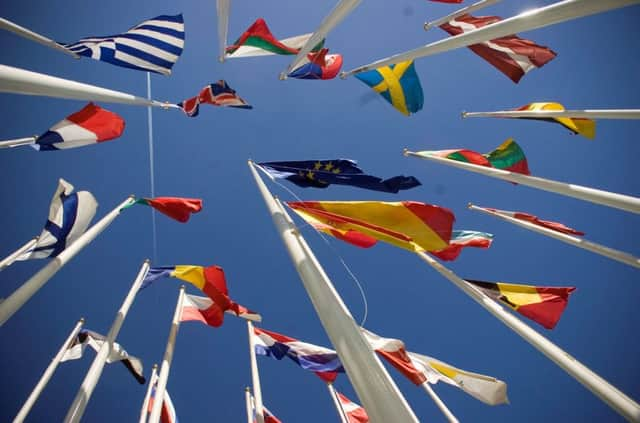Leaders: Europe must reform to head off isolationists


The austerity produced by the credit crunch and the global recession was bad enough for the continent’s economies. Add to that the brutal consequences of the eurozone’s implosion under the weight of its own inherent contradictions, and there was always going to be a political quid pro quo.
And so it has proved. The rise of populist right-wing parties in the European Parliament elections is not the only symptom of the political convulsions across the continent – the rise of protectionist parties of the left in Spain and Greece is a parallel phenomenon.
Advertisement
Hide AdAdvertisement
Hide AdAlthough they arise from entirely different political and ideological motivations, they have the same effect – the undermining of the cohesion and integrity of the European project, conceivably with terminal consequences.
Make no mistake, this is an existential moment for Europe and its institutions.
The leaders gathering in Brussels yesterday seemed aware of the importance of the summit. President Hollande was right when he said Europe’s institutions were too remote and incomprehensible. Prime Minister David Cameron was also correct when he said it could not be “business as usual”.
Of course there are voices that cautioned against allowing the parties of the far right to set the entire domestic and international agenda for a continent. But the implications of doing nothing, and allowing the disillusionment with Brussels to spread, are too great to take that risk.
There is one consolation in all this, and it is an ironic one. The scores of far-right politicians making their way to the European Parliament – some of them providing disturbing echoes of the fascist movements of the 1930s – have limited scope to do damage. The power of an MEP is much too weak for them to make more than a symbolic difference. And in any case they are comfortably outnumbered by parties who are committed to the continuance of the European project.
And therein lies the danger. The foolish response to the rise of the isolationists would be to push ever more aggressively for a unified European state, in defiance of the new arrivals. The Eurocrats must not be allowed to simply shrug, and carry on as they have done.
This would be disastrous. Europe must reform itself, or it will find itself made up of national governments elected on manifesto commitments to either leave the EU or abandon its institutions.
The economic consequences alone would make us all the poorer. But the vision of a Europe forged in the post-Second World War years to ensure peace and prosperity across a war-ravaged continent, would also be a casualty.
Sweet and sour note over warnings
Advertisement
Hide AdAdvertisement
Hide AdENOUGH, already. The call by Professor Simon Capewell, professor of public health at the University of Liverpool, for the government to put health warnings on sugary fizzy drinks is an insult to the intelligence of the general public.
People know that fizzy drinks contain sugar. People know that sugar makes you fat. People know that they should be consuming less of it to keep from piling on the weight.
Does the professor really think this has escaped anyone’s attention? Next he’ll be telling us that burgers are full of unhealthy grease. Prof Capewell says it is time to make sugar as socially unacceptable as smoking.
In doing so he makes one of the most common category errors in the field of public health.
Smoking, whether the occasional cigarette or a 20-a-day habit, is intrinsically bad for you. Consuming sugar in modest quantities is not. The same goes for alcohol consumption -– in moderation it is not a hazard to one’s health and may even have benefits. And it is hard to be a passive sugar victim as you walk past or work somewhere where sugar is taken. The health lobby seems to be unable to make the distinction as to the nature of the threat. To them, sugar and fat are the enemies, encouraging a mindset whereby food is a killer rather than a source of nourishment, not to mention something that can be enjoyed.
Public health zealots take the joy out of food. The best health advice encourages a balanced and varied diet in which we try to emulate the eating habits of Mediterranean cultures. This is only possible if we regard food as a pleasure, not as a poison.